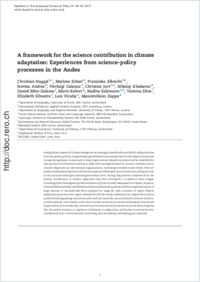A framework for the science contribution in climate adaptation: Experiences from science-policy processes in the Andes
- Huggel, Christian Department of Geography, University of Zurich, Switzerland
- Scheel, , Marlene Department of Geography, University of Zurich, Switzerland
- Albrecht, Franziska International Institute for Applied Systems Analysis, Laxenburg, Austria - Department of Geography and Regional Research, University of Vienna, Austria
- Andres, Norina Swiss Federal Institute of Forest, Snow and Landscape Research, Birmensdorf, Switzerland
- Calanca, Pierluigi Agroscope, Institute for Sustainability Sciences ISS, Zurich, Switzerland
- Jurt, Christine Department of Geography, University of Zurich, Switzerland - Agroscope, Institute for Sustainability Sciences ISS, Zurich, Switzerland
- Khabarov, Nikolay International Institute for Applied Systems Analysis, Laxenburg, Austria
- Mira-Salama, Daniel Environment and Natural Resources Global Practice, The World Bank, Washington, United States
- Rohrer, Mario Meteodat GmnbH, Zurich, Switzerland
- Salzmann, Nadine Department of Geography, University of Zurich, Switzerland - Department of Geosciences, University of Fribourg, Switzerland
- Silva, Yamina Geophysical Institute of Peru, Lima, Peru
- Silvestre, Elizabeth INCLIMA, Pueblo Libre, Lima, Peru
- Vicuña, Luis Department of Geography, University of Zurich, Switzerland
- Zappa, Massimiliano Swiss Federal Institute of Forest, Snow and Landscape Research, Birmensdorf, Switzerland
-
2015
Published in:
- Environmental Science & Policy. - 2015, vol. 47, p. 80–94
English
As significant impacts of climate change are increasingly considered unavoidable, adaptation has become a policy priority. It is generally agreed that science is important for the adaptation process but specific guidance on how and to what degree science should contribute and be embedded in this process is still limited which is at odds with the high demand for science contributions to climate adaptation by international organizations, national governments and others. Here we present and analyze experiences from the tropical Andes based on a recent science-policy process on the national and supra-national government level. During this process a framework for the science contribution in climate adaptation has been developed; it consists of three stages, including (1) the framing and problem definition, (2) the scientific assessment of climate, impacts, vulnerabilities and risks, and (3) the evaluation of adaptation options and their implementation. A large amount of methods has been analyzed for stage (2), and a number of major climate adaptation projects in the region assessed for (3). Our study underlines the importance of joint problem framing among various scientific and non-scientific actors, definition of socio-environmental systems, time frames, and a more intense interaction of social and physical climate and impact sciences. Scientifically, the scarcity of environmental, social and economic data in regions like the Andes continue to represent a limitation to adaptation, and further investments into coordinated socio-environmental monitoring, data availability and sharing are essential.
- Faculty
- Faculté des sciences et de médecine
- Department
- Département de Géosciences
- Language
-
- English
- Classification
- Geography
- License
-
License undefined
- Identifiers
-
- RERO DOC 255858
- DOI 10.1016/j.envsci.2014.11.007
- Persistent URL
- https://folia.unifr.ch/unifr/documents/304361
Statistics
Document views: 165
File downloads:
- pdf: 516
